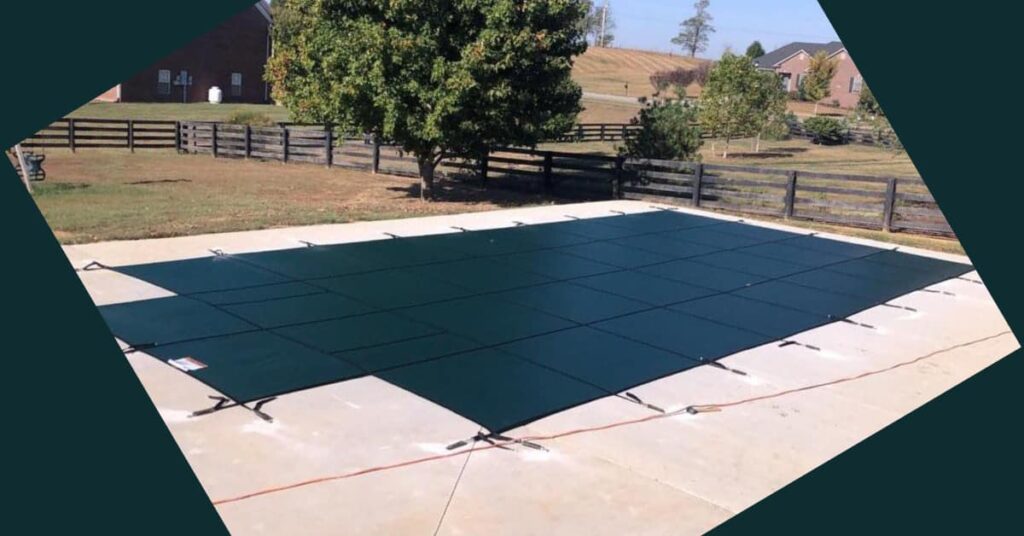Maximizing Off-Season Benefits: The Importance of Using a Safety Cover on Your Pool
As the vibrant summer days give way to the cooler months of fall and winter, many pool owners may consider closing their pools for the off-season. While some might believe that covering a pool during this time is an unnecessary step, the truth is that using a safety cover on your pool during the off-season brings many benefits beyond the surface.
Let’s explore why a safety cover is a wise choice to safeguard your pool and ensure its longevity during reduced use.
Protection from Debris
One of the most significant advantages of using a safety cover during the off-season is its protection against debris. Fallen leaves, twigs, dirt, and other outdoor elements can quickly accumulate in an uncovered pool, contaminating water and increasing maintenance demands.
A safety cover acts as a robust barrier, preventing debris from entering the pool and reducing the need for extensive cleaning once the pool is ready to be reopened.
Maintenance Minimization
Closing down a pool involves various maintenance tasks, from adjusting chemical levels to cleaning the water and pool surfaces. By using a safety cover, you significantly minimize the maintenance requirements during the off-season.
The cover shields the pool from exposure to sunlight and the elements, which means less evaporation, fewer chemical adjustments, and reduced overall upkeep. When it’s time to reopen the pool, you’ll find the water in better condition and the reopening process much smoother.
Winterizing Efficiency
Winterizing a pool is vital in preventing damage caused by freezing temperatures. A safety cover plays a crucial role in this process. By keeping the pool covered, you avoid the accumulation of snow and ice, which can lead to structural damage and cracked surfaces.
The cover also helps maintain a more stable water temperature, reducing the risk of freezing and potential damage to pool equipment.
Safety and Security
The safety aspect of a safety cover extends to the off-season as well. When your pool is covered with a safety cover, it becomes a secure barrier against accidental entry. This is especially important if you have children, pets, or wildlife nearby.
The cover’s ability to withstand weight ensures that it can support a person’s or animal’s importance, adding an extra layer of protection.
Cost Savings
Using a safety cover on your pool during the off-season offers cost-saving benefits. The reduced need for maintenance, chemicals, and water replacement translates into significant savings over time.
Additionally, by preventing debris and minimizing evaporation, you conserve water and reduce energy consumption, contributing to a more sustainable and environmentally friendly approach to pool ownership.
Extended Lifespan
Your pool is an investment you want to last for many years. A safety cover contributes to the longevity of your pool by shielding it from the harsh effects of winter weather, UV rays, and debris. Minimizing exposure to these elements reduces the risk of wear and tear, which can lead to costly repairs and replacements down the line.
Choosing the Right Safety Cover: Mesh or Solid?
Now that you know the numerous benefits a safety cover can bring to your pool during the off-season, the next step is to determine which type of safety cover suits your needs best: mesh or solid. Both options have advantages and considerations, so understanding their differences can help you make an informed decision.
Mesh Safety Covers
Advantages
- Debris Drainage: Mesh safety covers are designed with tightly woven fabric that allows water to pass through while blocking debris. This means that rainwater won’t accumulate on the cover, reducing the risk of sagging due to excess weight and preventing the formation of puddles.
- Lightweight: Mesh covers are generally lighter than solid covers, making them easier to handle during installation and removal. This can be particularly convenient if you plan to put the cover on and take it off yourself.
- Algae Prevention: The mesh material allows sunlight to reach the water beneath the cover, which can help inhibit algae growth. This can save you time and effort in pool-opening procedures.
- Cost-Effective: Mesh covers are often more budget-friendly than solid covers, making them an attractive option for pool owners looking for adequate protection without breaking the bank.
Considerations
- Debris Infiltration: While mesh covers effectively block larger debris, some smaller particles might still enter the pool. However, this can usually be mitigated with light cleaning upon pool reopening.
- Sunlight and Water Evaporation: The same feature that prevents algae growth—allowing sunlight to pass through—can also lead to increased water evaporation. This might necessitate more frequent water level checks during the off-season.
Solid Safety Covers
Advantages
- Maximum Debris Protection: Solid safety covers completely block sunlight and debris from entering the pool, ensuring that your pool remains virtually debris-free when you reopen it.
- Sunlight and Algae Prevention: Solid covers inhibit algae growth by preventing sunlight from reaching the water, reducing the need for chemical treatments upon pool reopening.
- Durability: Solid covers are generally more durable and can withstand the weight of heavy snowfall and other environmental factors, making them a suitable choice for harsh winter conditions.
- Insulation: Solid covers provide better insulation, which helps retain heat and reduce energy consumption during the off-season.
Considerations
- Water Accumulation: Since solid covers may not allow water to drain through; you might need a cover pump to remove accumulated rainwater or melting snow. Failure to do so could cause the cover to sag or tear due to excess weight.
- Installation and Removal: Solid covers are heavier and might require more effort to install and remove, especially if you do it independently.
Get Help Choosing Which Pool Safety Cover is Best For You
Using a safety cover on your pool during the off-season is a strategic decision that offers many benefits. From protecting against debris and minimizing maintenance to enhancing safety and prolonging the lifespan of your pool, the advantages are undeniable. By taking this extra step, you ensure that your pool remains in top condition, ready to provide enjoyment and relaxation when the warmer months return.
So, choosing between a mesh safety cover and a solid safety cover depends on your specific needs, priorities, and the conditions in your area. To help you evaluate your needs and consider factors like climate, maintenance, and budget to determine which type of safety cover aligns best with your pool management goals, contact True Blue Pools in Kentucky today.
Whether you opt for mesh or solid, the important thing is that you’re taking a proactive step toward ensuring the longevity and well-being of your pool.





